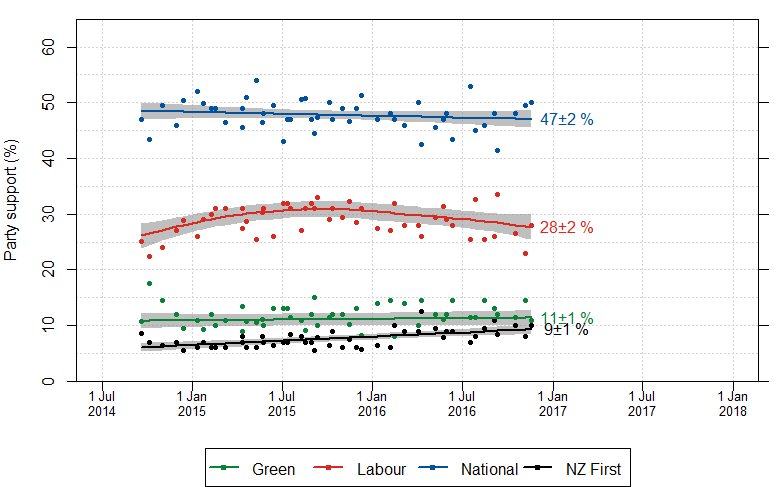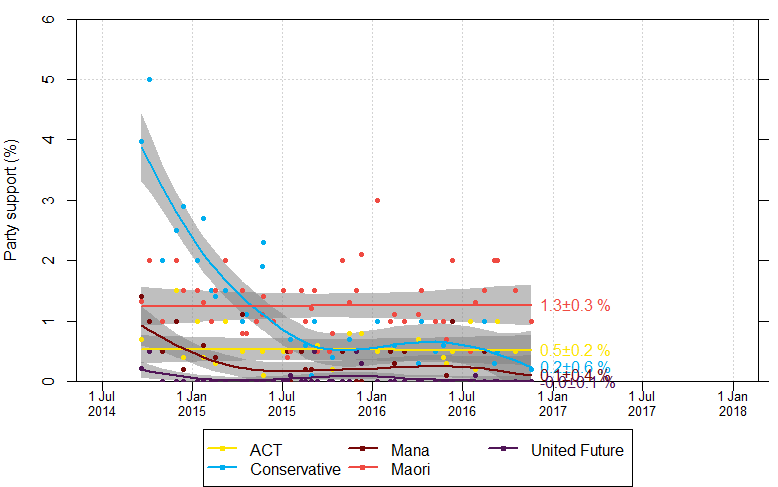New Zealand general election, 2017
| | |||||||||||||||||||||||||||||||||||||||||||||||||||||||||||||||||||||||||||||||||||||||||||||||||||||||||||||||
| |||||||||||||||||||||||||||||||||||||||||||||||||||||||||||||||||||||||||||||||||||||||||||||||||||||||||||||||
| |||||||||||||||||||||||||||||||||||||||||||||||||||||||||||||||||||||||||||||||||||||||||||||||||||||||||||||||
| |||||||||||||||||||||||||||||||||||||||||||||||||||||||||||||||||||||||||||||||||||||||||||||||||||||||||||||||
The 2017 New Zealand general election will be held after the current 51st New Zealand Parliament is dissolved or expires. The current Parliament was elected on Saturday, 20 September 2014. The last possible date for the election to be held is Saturday, 18 November 2017.
Background
Election date
Unless an early election is called or the election date is set to circumvent holding a by-election, a general election is held every three years. The last election was held on Saturday, 20 September 2014.[1]
The Governor General must issue writs for an election within seven days of the expiration or dissolution of the current Parliament.[2] Under section 17 of the Constitution Act 1986, Parliament expires three years "from the day fixed for the return of the writs issued for the last preceding general election of members of the House of Representatives, and no longer." The writs for the 2014 election were returned on 10 October 2014, a day late due to a judicial recount of the Te Tai Tokerau electorate.[3] As a result, the 51st Parliament will expire, if not dissolved earlier, on Tuesday, 10 October 2017. Consequently, the last day for issuance of writs of election is 17 October 2017. The writs must be returned within 50 days of their issuance (save for any judicial recount or death of a candidate), which will be Wednesday, 6 December 2017.[4] Because polling day must be a Saturday[4] and two weeks is generally required for the counting of special votes, the last possible date for the next general election is Saturday, 18 November 2017.
Electorate boundaries
Electorates in the election will be the same as at the 2014 election. New boundaries are not due until early 2019, after the 2018 census.
Marginal seats in 2014
At the 2014 general election, the following seats were won with a majority of less than 1000 votes.
| Electorate | Member of Parliament | Incumbent party | Majority | Second place | Second party | ||
|---|---|---|---|---|---|---|---|
| Auckland Central | Nikki Kaye | National | 600 | Jacinda Ardern | Labour | ||
| Hutt South | Trevor Mallard | Labour | 709 | Chris Bishop | National | ||
| Ōhāriu | Peter Dunne | United Future | 710 | Virginia Andersen | Labour | ||
| Te Tai Tokerau | Kelvin Davis | Labour | 743 | Hone Harawira | Mana | ||
Retiring MPs
Eight existing Members of Parliament have announced that they will not stand for re-election.
| Name | Party | Electorate/List | Term in office | |
|---|---|---|---|---|
| Clayton Cosgrove [5] | Labour | List | 1999–present | |
| David Cunliffe[6] | New Lynn | 1999–present | ||
| Chester Borrows[7] | National | Whanganui | 2005–present | |
| John Key[8] | Helensville | 2002–present | ||
| Jono Naylor[9] | List | 2014–present | ||
| Hekia Parata[10] | List | 2008–present | ||
| Lindsay Tisch[11] | Waikato | 1999–present | ||
| Maurice Williamson[12] | Pakuranga | 1987–present | ||
List-only MPs
Murray McCully (National) announced in February 2016 that he will not seek re-election as the electorate MP for East Coast Bays but may stay on as a list MP.[13] Trevor Mallard announced in July 2016 that he will not contest Hutt South, but will run as a list-only candidate, with the intention of becoming Speaker of the House.[14]
Opinion polling
Opinion polls have been undertaken periodically since the 2014 election by Fairfax Media, MediaWorks New Zealand, The New Zealand Herald, Roy Morgan Research, and Television New Zealand. The graph on the left below shows the collated results of all five polls for parties that polled above the 5% electoral threshold at the 2014 election; The graph on the right shows results for parties that polled between 1% and 4.9%, or won an electorate seat, at the 2014 election.
 |
 |
References
- ↑ "New Zealand Election Results". Electoral Commission. Retrieved 21 September 2014.
- ↑ "Electoral Act 1993, Sec. 125". Legislation.co.nz. 17 August 2011. Retrieved 5 December 2011.
- ↑ "General election key dates". Electoral Commission (New Zealand). Retrieved 24 August 2014.
- 1 2 "Electoral Act 1993, Sec. 139". Legislation.co.nz. 17 August 2011. Retrieved 5 December 2011.
- ↑ "Labour MP Cosgrove won't stand again". NZ Herald. 2016-04-10. Retrieved 2016-04-10.
- ↑ http://www.nzherald.co.nz/nz/news/article.cfm?c_id=1&objectid=11739785
- ↑ "In hindsight National's Chester Borrows says he "could have had more fights" as an MP". Stuff.co.nz. 29 November 2016. Retrieved 29 November 2016.
- ↑ "John Key to resign as New Zealand Prime Minister and National Party leader". 5 December 2016.
- ↑ Galuszka, Jono (3 November 2016). "Palmerston North MP Jono Naylor quitting politics after one term". Stuff.co.nz. Retrieved 3 November 2016.
- ↑ Jones, Nicholas (19 October 2016). "Education minister Hekia Parata will not contest next general election". The New Zealand Herald. Retrieved 19 October 2016.
- ↑ "MP Lindsay Tisch not to seek re-election". stuff.co.nz. 20 June 2016. Retrieved 20 June 2016.
- ↑ Jones, Nicholas (26 July 2016). "National and Pakuranga MP Maurice Williamson to leave Parliament". The New Zealand Herald. Retrieved 26 July 2016.
- ↑ "Foreign Affairs Minister Murray McCully won't contest East Coast Bays at 2017 election". Stuff.co.nz. Fairfax. 24 February 2016. Retrieved 10 April 2016.
- ↑ Boyack, Nicholas (25 July 2016). "Labour MP Trevor Mallard vacates Hutt South electorate to apply for Speaker position". Stuff.co.nz. Retrieved 25 July 2016.







